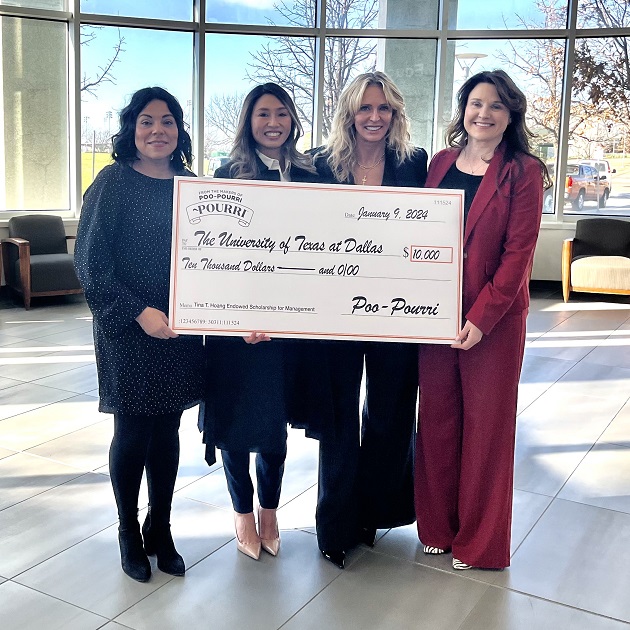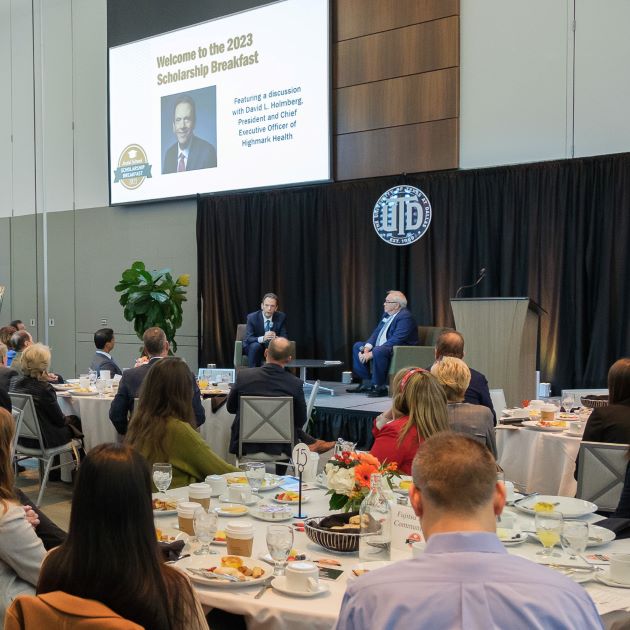Corporate culture was at the forefront of discussion at the 16th Corporate Governance Conference, an annual event organized by the Institute for Excellence in Corporate Governance at the Naveen Jindal School of Management.
Approximately 200 audience members comprised of executives, board members, institute members and other interest groups gathered at the Davidson-Gundy Alumni Center on the campus of The University of Texas at Dallas. The daylong slate of speakers discussed not only corporate culture but also geopolitical risk, campaign finance reform, the history of the regulatory state and how to build strategic boards.
“Diversity and culture were two of the key themes at this year’s conference,” said Dennis McCuistion, clinical professor and executive director of the institute. “There is a push at the national and international levels for boards to be more focused on issues other than shareholder value.”
McCuistion said that the institute wanted to invite speakers who are in the vanguard on those issues, and they shared not only their opinions but methods for achieving better culture and diversity.
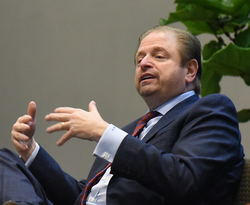
Keynote speaker Mike Fucci, chairman of the board at Deloitte, one of the Big Four professional service firms, spoke about what culture means for Deloitte’s board of directors.
“It is the board’s responsibility to make sure that people get treated respectfully, that people are not afraid to ask questions,” he said.
As an example of how respect for employees can be demonstrated even in small ways, Fucci described Deloitte’s commitment to hiring people in creative areas in recent years, and the resulting effort to relax the workplace dress code.
“If you walk around on our digital floor, you’ll see people with blue hair and, you know, jeans and unshaven, [with] beards,” he said. “And that’s totally acceptable.”
Fucci explained that the company’s practice of hiring “virtual workers,” those who work in settings other than the company’s offices across the world, has made it difficult to have one discreet culture. Instead, he said, Deloitte has had to implement what he calls cultural principles.
“If some people never come to your office — say they live in Saskatoon or something because their job can be done totally virtually — they have to understand that they still need to contribute to the culture of your organization,” he said. “It’s not that anyone is trying to develop a specific culture; it’s understanding that, because who we’re hiring is going to change the culture, you have to be understanding that that well could happen.”
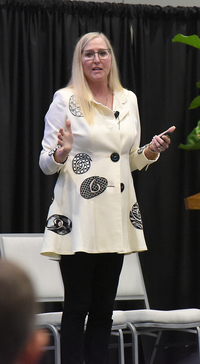
Mamie Jones, senior vice president of product development at Intuit, was this year’s Max Hopper speaker. Hopper (1934-2010), a former chairman of the Jindal School’s Advisory Council, was an information systems pioneer. He developed the computerized airline reservation system for SABRE while serving as chief information officer of AMR, the parent company of American Airlines. Prior to his innovations, jobs like CIO were not common.
“He changed the culture at American because prior to his system, it was largely people following a paper trail,” said Dr. Diane McNulty, associate dean for external affairs and corporate development at the Jindal School. “He helped start corporations down a path of cultural change that arose from technological innovation.”
Jones spoke on “How to Improve Your Company’s Culture.” She shared her “playbook” for cultural transformation, a process that she has developed for 30 years and has taught to numerous organizations.
“Transformation is easy to talk about,” she said, “…but it is extremely difficult to do.”
She spoke specifically about how corporate boards can lead cultural transformation by telling the audience what Intuit’s CEO Brad Smith had said about that topic.
“The board members set the strategy, the policy and the roles — and then you hire the best and the brightest and let that leadership team do its job,” she said.
The keys to cultural change, she explained, are creating the right environment, capturing hearts and minds, staying the course and recognizing that transformation is a journey.
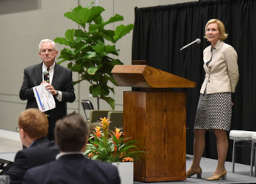
Darla Stuckey, president and CEO of the Society for Corporate Governance, capped the event with a presentation titled “Investor Expectations and Corporate Culture.” She relayed to the audience pertinent details of a controversial letter written by BlackRock Chairman and CEO Laurence D. Fink this past January in which he outlined a new approach to corporate governance that includes social responsibility. Stuckey explained that she had received numerous emails with reactions that ranged from outrage to indifference. Even so, she explained that she thinks change is inevitable in terms of the bounds of corporate responsibility, especially as it relates to issues such as board diversity, social issues and the gender pay gap.
“I do think we are at an inflection point,” she said. “I do think it is actually more than just the rise of… the institutional investor. I was trained that [ensuring] returns to shareholders was the only thing you had to do. That’s no longer the case, neither for public nor private companies. And if you don’t know that, you will hear it from your millennial children.”
McCuistion was pleased with the turnout and the level of discourse at the event, which aligned perfectly with the institute’s goals.
“Institute members are very diverse,” he said. “Our new Governance Capital Model has a primary focus on culture and stakeholder interests, not just shareholder interest. This event reinforces what we are working on with our members.”




